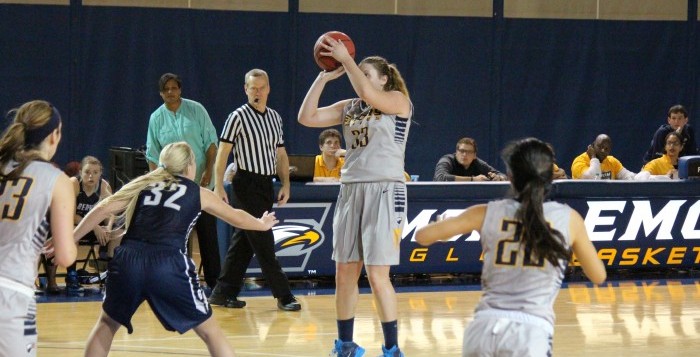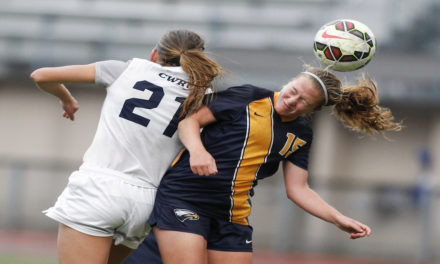
Junior forward Sarah Arington takes a shot. After consecutive losses to Birmingham-Southern College (Ala.) and Maryville College (Tenn.), Arington and the Eagles defeated Sewanee: The University of the South (Tenn.) at home on Tuesday. Photo by Mark Spicer/Staff.
By Oliver Rockman
Staff Writer
After losing their previous two games, the Emory women’s basketball team landed on their feet Tuesday night against previously undefeated Sewanee: The University of the South (Tenn.), winning 68-45.
The win elevated the Eagles’ record to 4-2.
The game was initially hotly contested, as Sewanee held a 10-9 lead before the Eagles scored 14 unanswered points, spearheaded by a pair of three pointers from guards junior Khadijah Sayyid and sophomore Shellie Kaniut. Head Coach Christy Thomaskutty was pleased with the Eagles’ competitive drive after they struggled in their previous home game against Birmingham-Southern College (Ala.).
“We gave a great effort. We did not a week ago [against Birmingham-Southern], and paid for it,” she said. “Our bigger issue was that a team embarrassed us on our home court. [At home, our opponents are] going to have to battle to beat us.”
The Eagles did not let go of their 23-10 lead, and in the second half, had an advantage as big as 26. Kaniut scored an impressive 19 points, making three of her four three-point attempts, and Sayyid chipped in an additional 15.
Sophomore Michelle Bevan added 11 points off the bench, a career best. Thomaskutty said the entire team contributed to the win, but mentioned Sayyid, as well as junior guard Ilene Tsao, for their specific roles in the victory.
“What you saw last night was incremental improvement from every player. K.J. [Sayyid] did so many things defensively, and Ilene was the glue throughout her 30 minutes,” she said. “As a team, we showed great improvement.”
Tsao also credited the entire team’s effort in securing the victory.
“Our transition game and ability to execute our press was a key factor to the game,” she said. “They struggled to keep up with our fast tempo and ended up having to rush a lot of their shots.”
She identified two teammates whom she felt deserved additional praise.
“Shellie Kaniut had a great offensive game and really set the pace as the point guard, while K.J. Sayyid created a lot of havoc by pressuring Sewanee’s ball handlers.”
In the team’s losses, the Eagles didn’t show great intensity, Thomaskutty said.
Against Sewanee, things changed, and Thomaskutty believes the team’s mentality is one of their keys to victory.
“[We have been] starting off really slow,” she said. “That’s what we’ve been practicing: can we stay intense throughout a practice and then a game?”
As the season progresses, an improvement on defense will lead to better offensive opportunities, which will be followed by greater success, according to Thomaskutty.
“We’ve got to continue to shore up our defense. Anytime we get a stop, it’s amazing how much better of a shot we get,” Thomaskutty said.
Tsao affirmed Thomaskutty’s feelings of a strong need for defensive improvement.
“There are many areas of improvement for our team at this point in the season, but we are trying to focus on defense and rebounding,” she said. “If we can keep teams to low field goal percentages and play lockdown defense, it will transfer over to the offensive end.”
The team will look to put those changes into practice next Monday, Dec. 8, when they host neighbors Agnes Scott College (Ga.) at 6 p.m.
– By Oliver Rockman, Contributing Writer
The Emory Wheel was founded in 1919 and is currently the only independent, student-run newspaper of Emory University. The Wheel publishes weekly on Wednesdays during the academic year, except during University holidays and scheduled publication intermissions.
The Wheel is financially and editorially independent from the University. All of its content is generated by the Wheel’s more than 100 student staff members and contributing writers, and its printing costs are covered by profits from self-generated advertising sales.






